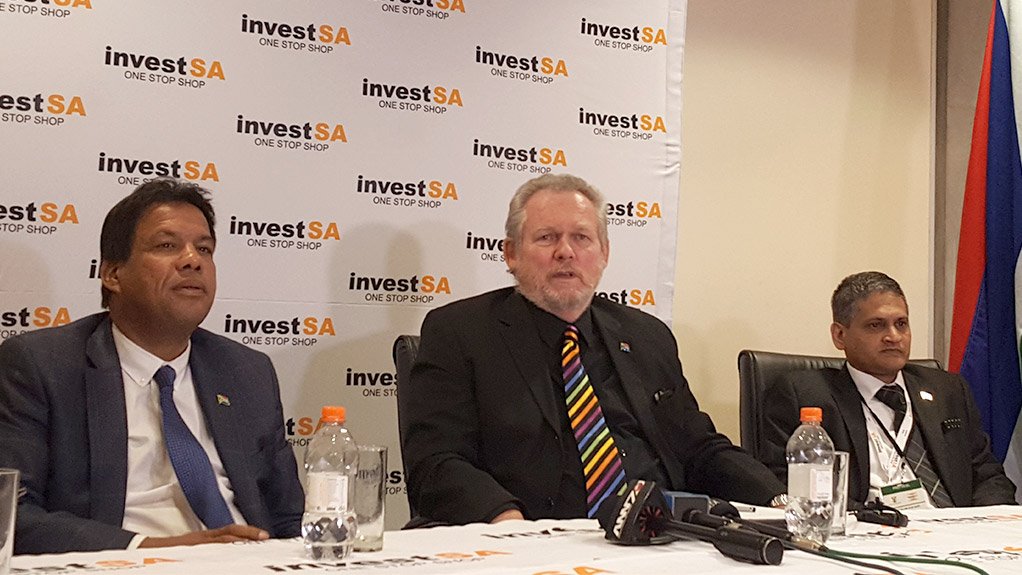The South African government has officially launched a new investment facilitation service, dubbed InvestSA, which it claims will dramatically reduce red tape for foreign and domestic businesses seeking to pursue greenfield or brownfield projects in the country.
The service, which has both physical and virtual dimensions, is punted as a one-stop shop facility, bringing under one umbrella the various government departments and agencies investors deal with to secure the permits, licences and incentives required to facilitate their investments.
The national office, located at the Department of Trade and Industry’s (DTI’s) Pretoria Campus, was officially inaugurated by President Jacob Zuma on Friday, with three provincial offices to be rolled out in Gauteng, KwaZulu-Natal and the Western Cape later this year.
Trade and Industry Minister Dr Rob Davies says the one-stop shop was conceived together with the Presidential Business Working Group in 2015 and is a direct response to ongoing appeals from business for government to streamline the bureaucracy associated with investing in the country.
Besides the DTI, the national one-stop shop will house senior officials from the departments of Home Affairs, Labour and Environmental Affairs, as well as Eskom, the South African Revenue Service and the Companies and Intellectual Property Commission.
It will offer specialist advisory services to investors relating to South Africa’s economic, regulatory and legislative environment, while also showcasing the industrial financing incentives available.
Davies stresses that InvestSA will not be empowered to bypass the country’s regulations, but will seek to help investors navigate these requirements so as to fast-track investments. For instance, there is scope to accelerate approvals relating to environmental impact assessments, or for securing work permits for foreign personnel who are critical to ensuring the investment takes place.
“We are aiming to deliver a far more professional and efficient service,” Davies avers, adding that the intention is also to improve the perception of South Africa as welcoming destination for investors.
As part of efforts to improve investor perceptions, government intends requesting the World Bank to review the country’s business-facilitation ranking, which the bank downgraded in its latest ‘Doing Business’ publication, which measures countries on the regulations that either enhance or constrain business activity.
In the 2017 edition, the bank ranked South Africa at 74 out of 190 countries, a decline of two places from the 2016 Doing Business report. The country came in behind Mauritius (49) Rwanda (56) and Botswana (71), but ahead of Nigeria (169).
Zuma reports that InvestSA will coordinate with the World Bank on a reform memorandum, over a period of three to five years, to improve South Africa’s ranking. “We want to be reviewed by the World Bank and we are convinced that our rankings will improve considerably.”
Davies is convinced that the InvestSA design, which draws lessons for investment facilitation initiatives in Ireland, Singapore, Malaysia, Thailand and Egypt, incorporates global best practices. He also admits that there are competitive pressures on countries such as South Africa to improve both their performance in facilitating investments, as well as investor perceptions.
POLICY CERTAINTY?
The initiative has been launched at a time when South Africa is struggling to attract both foreign and domestic investment, which is seen as a prerequisite for extracting the country from its current low-growth path – South Africa grew by only 0.3% in 2016 and the expectation for 2017 is for the country to expand only marginally above 1%.
Davies acknowledged that investment facilitation needed to be backed by policy certainty, making specific reference to the need to finalise the Mineral and Petroleum Resources Development Act amendments, which is seen as a prerequisite for rekindling investment in the mining sector.
However, he insists that South Africa remains a compelling investment case and insists that government is prioritising the attraction of investment through the Inter-Ministerial Committee on Investment, which comprises 18 Cabinet Ministers and is chaired by Zuma.
The committee has identified a package of 40 possible investment opportunities, which are being “championed” by individual Ministers for completion during the administration’s current term, which ends in 2019.
Davies says the projects are at various stages of development and across various sectors of the economy.
“The pipeline includes projects in feasibility to ones in implementation,” he says, highlighting the Beijing Automotive Investment Corporation’s automotive investment at Coega, in the Eastern Cape, and Cipla’s biotechnology investment at the Dube TradePort, in KwaZulu-Natal, as examples of projects being overseen by the inter-Ministerial committee.
EMAIL THIS ARTICLE SAVE THIS ARTICLE ARTICLE ENQUIRY
To subscribe email subscriptions@creamermedia.co.za or click here
To advertise email advertising@creamermedia.co.za or click here











